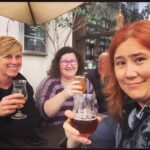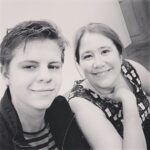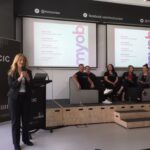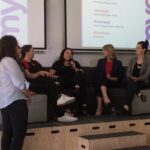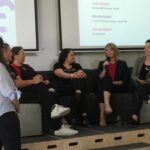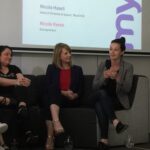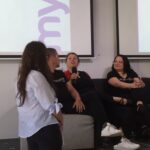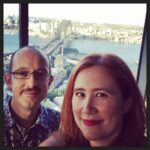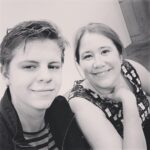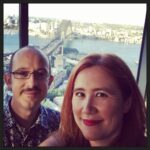Always the start of a legendary evening…
Month: November 2016
-
Shared today on Twitter
My Weekly Meetup Wrap: Sydney Scrum & AI meetups, #shestarts kickoff & mentoring, and @MYOB @StartupDailyANZ panel! https://t.co/kxkgEhFoHU
I ❤️ this! Way to go @juliamyob!! https://t.co/oS5bXclCqL
RT @evanderkoogh: Hey Melbourne agile people: @WoodyZuill Tuesday/Wednesday have opened up. Get him in your organisation for a workshop on…
@jesslynnrose @aimee_maree @andypiper @_katwu Film & Theater degree, right here! 😂
What is the point of using the self-service machine to print your bag tags if you still have to stand in an enormous queue & talk to human?
Third flight to Melb in as many weeks. Excited for #yowconf!! @yow_oz (@ T2 Multi-User Domestic Terminal) https://t.co/ebUj1vFayx
-
Shared today on Facebook
This week I made it to FIVE events, including Sydney Scrum and AI meetups, SheStarts kickoff and mentoring session, and MYOB and Startup Daily “Women in Tech” panel at UNSW. Phew!
Third flight to Melb in as many weeks. Excited for #yowconf!! @yow_oz
-
Shared today on Twitter
RT @linuxconfau: We’re looking for volunteers to help make #lca2017 a huge success. If you can help out, read https://t.co/LhlcgxQ8Ix to fi…
Very cool! @WWCSyd are hosting pre-@yow_oz meetup with 3 amazing women speakers: @randommood @rebeccaparsons @caitie https://t.co/e1467aK5lJ
RT @JamieDobson: What an amazing line up at @yow_oz, @IanDCrosby. No pressure, you’re there on merit but you will learn a lot!
https://t.c…
-
Shared today on Twitter
Checking out the Workroom coworking space with my minion. https://t.co/ZukDuPUcAG https://t.co/6L1eiIKhvj
Excited for today’s Women in Tech panel with folks from @MYOB and @BlueChilliGroup. @Clr_Angela kicking us off! #developHer #SheStarts https://t.co/8H13CmS99z
Having data on diversity is one thing. Actually doing something about it is another. @KeoghAlla from @MYOB #developHER https://t.co/xhQDaLRzwF
My third time this week hearing the amazing @nic_hazell talk about the genesis of #SheStarts and @BlueChilliGroup’s diversity efforts. https://t.co/aGQSr3wx85
Lessons from @nicole_kersh on the need for role models and mentors for women entrepreneurs. https://t.co/bhvC0fy4Ez #developHER #SheStarts https://t.co/TE8sZtCFtx
Neat! @juliamyob says the 1st #developHER cohort included many spouses of @MYOB devs. Great so many men supportive of techie partners! https://t.co/6bY86PSR9v
Weekend coding camps like RailsGirls and NodeGirls are great, but there is a need for support afterwards. That’s where #developHER comes in.
Just realised you can actually watch this talk online! https://t.co/Fa0OYU441r
Intriguing idea from @nicole_kersh: some sort of Pay Parity Certification where companies show they pay equitably! 👏 @MYOB @StartupDailyANZ
Ugh. The US election rears its head. I can’t go anywhere, even in Australia, without being reminded of this awfulness. Ruins everything. 😞
RT @nic_hazell: Love seeing your face in the audience every time @web_goddess – and especially love your brilliant leadership on tech diver…
Christmas party time! Hair and lippie are working. Circle skirt on windy day… not so muc… https://t.co/kw4HTGdGrs https://t.co/abLg8CLxwK
RT @yow_oz: Our @web_goddess asked @ghohpewhat’s the difference between his book
& his one day workshop. Read the interview here https://t.…
@yow_oz Awwwww, YOUR @web_goddess! ☺️
Pretty amazing venue for a party! https://t.co/i8IF3bRXRu https://t.co/CvY850te8v
Smooch with Opera House. https://t.co/GeK020IsPT https://t.co/gCASJKJgQA
@FakeSamRitchie @yow_oz The lovely folks at @dius_au were kind enough to invite me along. 🙂
@sebastiangrail Yes! I’d never been before. Stunning.
@sebastiangrail WOW!!!!
@sebastiangrail Pics or it didn’t happen.
@sebastiangrail Hopefully I’ll be around tomorrow night if you don’t leave too early!
RT @DaniTaylor678: Amazing Margaret Hamilton awarded the Pres Medal of Freedom. #Inspiring future generations of female scientists. #STEMwo…
Congrats @simonraikallen! It was obvious when I visited @MYOB the influence you’ve had on the culture. Well deserved! https://t.co/JBfsx1muiv
@gilmae Ugh. Years late and they gave it the wrong name. Cherpumple4lyfe.
RT @SvenNotnop: My interview (along with @smithcdau for @TheAgilePodcast with @pragdave at @yow_oz #oneofmyfavs #agile #raccoon https://t.c…
@sebeckmas That looks… dangerous!
Video from our recent @yow_oz YOW! Night with @auxesis @DTO – “Breaking the Cylinders of Excellence” https://t.co/DWsLU2tvV2
Upcoming event: @GA’s Hour of Code at GA: Part of the Global #Hourofcode Movement: https://t.co/hE8czgdJNQ
-
Shared today on Facebook
Checking out the Workroom coworking space with my minion.
Christmas party time! Hair and lippie are working. Circle skirt on windy day… not so much. 💨👗😳
Pretty amazing venue for a party!
Smooch with Opera House.
Video from the YOW Night we hosted recently at Canva with Lindsay Holmwood from the Australian government’s Digital Transformation Agency.

